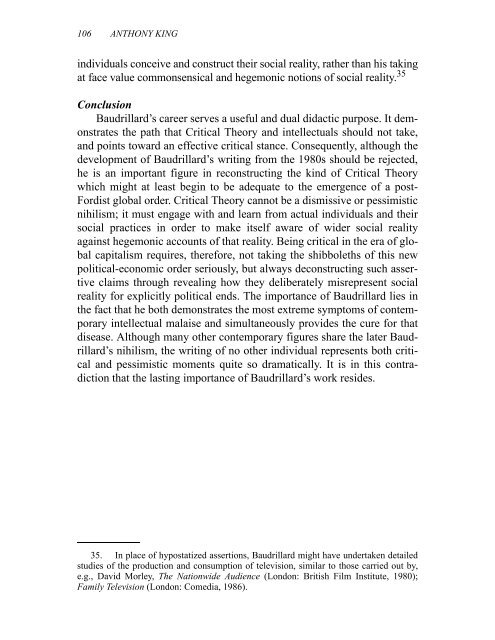King Baudrillard Telos.pdf - Exeter Research and Institutional ...
King Baudrillard Telos.pdf - Exeter Research and Institutional ...
King Baudrillard Telos.pdf - Exeter Research and Institutional ...
You also want an ePaper? Increase the reach of your titles
YUMPU automatically turns print PDFs into web optimized ePapers that Google loves.
106 ANTHONY KING<br />
individuals conceive <strong>and</strong> construct their social reality, rather than his taking<br />
at face value commonsensical <strong>and</strong> hegemonic notions of social reality. 35<br />
Conclusion<br />
<strong>Baudrillard</strong>’s career serves a useful <strong>and</strong> dual didactic purpose. It demonstrates<br />
the path that Critical Theory <strong>and</strong> intellectuals should not take,<br />
<strong>and</strong> points toward an effective critical stance. Consequently, although the<br />
development of <strong>Baudrillard</strong>’s writing from the 1980s should be rejected,<br />
he is an important figure in reconstructing the kind of Critical Theory<br />
which might at least begin to be adequate to the emergence of a post-<br />
Fordist global order. Critical Theory cannot be a dismissive or pessimistic<br />
nihilism; it must engage with <strong>and</strong> learn from actual individuals <strong>and</strong> their<br />
social practices in order to make itself aware of wider social reality<br />
against hegemonic accounts of that reality. Being critical in the era of global<br />
capitalism requires, therefore, not taking the shibboleths of this new<br />
political-economic order seriously, but always deconstructing such assertive<br />
claims through revealing how they deliberately misrepresent social<br />
reality for explicitly political ends. The importance of <strong>Baudrillard</strong> lies in<br />
the fact that he both demonstrates the most extreme symptoms of contemporary<br />
intellectual malaise <strong>and</strong> simultaneously provides the cure for that<br />
disease. Although many other contemporary figures share the later <strong>Baudrillard</strong>’s<br />
nihilism, the writing of no other individual represents both critical<br />
<strong>and</strong> pessimistic moments quite so dramatically. It is in this contradiction<br />
that the lasting importance of <strong>Baudrillard</strong>’s work resides.<br />
35. In place of hypostatized assertions, <strong>Baudrillard</strong> might have undertaken detailed<br />
studies of the production <strong>and</strong> consumption of television, similar to those carried out by,<br />
e.g., David Morley, The Nationwide Audience (London: British Film Institute, 1980);<br />
Family Television (London: Comedia, 1986).
















